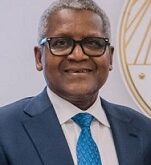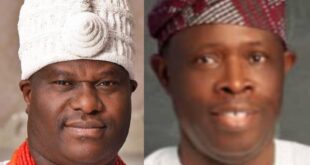For the record:
Dr. Ngozi Okonjo-Iweala, former Minister of Finance and current Director General of the WTO, recently shared a disturbing account of her experience with the petrol subsidy issue in Nigeria.
She revealed that many of those benefiting from the flawed system were powerful individuals in society who held positions of influence.
As Finance Minister and Economy Coordinator, Okonjo-Iweala fought against the fraudulent subsidies. Through an audit, she discovered that $2.5 billion worth of claims were fraudulent out of the $8.4 billion audited.
However, her efforts were met with strong opposition from those who profited from the corrupt system.
In a shocking revelation, Okonjo-Iweala disclosed that her mother was kidnapped by individuals who demanded her resignation.
These individuals blamed her for not paying the oil marketers their dues. The kidnappers wanted her to publicly announce her resignation and leave the country as a condition for her mother’s release.
The situation was incredibly distressing for Okonjo-Iweala, as her mother, a retired Professor, was held captive for five days.
She was terrified and learned that her life was in danger because of her daughter’s refusal to succumb to the blackmail and pay the fraudulent claims.
It was an agonizing period for Okonjo-Iweala, facing the prospect of her mother losing her life due to her efforts to implement policies that would benefit the country.
Despite the grave risks involved, Okonjo-Iweala, with the support of her father and the determination of the President, chose not to give in to the blackmailers and refused to resign.
After a manhunt by security agencies, her mother was able to make a dramatic escape after enduring five days of captivity with limited provisions.
This harrowing incident highlights the difficult and dangerous circumstances surrounding the reform of the petrol subsidy policy.
The entrenched vested interests fought back against the necessary changes, posing threats to Okonjo-Iweala’s family and attempting to derail the implementation of the reforms.
Reflecting on these events, Okonjo-Iweala questions the choices she made and the potential outcome if her mother had not escaped.
She wonders whether it would have been justifiable to prioritize her mother’s life over firmness on policy and standing up to the blackmailers. It remains a haunting question for her.
This account sheds light on the deep-rooted corruption and power dynamics surrounding the petrol subsidy issue in Nigeria, with influential figures using their positions to protect their interests at the expense of the country’s progress.
She continued, “My second example has to do with a very specific one in my country, the clean-up of the fuel scarcity regime in 2012 during my second stay as Finance Minister.
“Nigeria has a physically challenging force of fuel regime, the country exports crude oil and imports fuel because their refineries are in a very bad shape and provides a subsidy for the refined oil as support.
“At the end of 2011, a total of N1.73tr, US $11b equivalent, was submitted as claims for subsidy by 143 marketers, who were importing the product.
“These numbers seemed horrendously large compared to what I had last when I was in government in 2006, which was close to $2b in subsidy.
“So, we decided to study these claims. We audited about $8.4b worth of claims and we found out $2.5b worth of fraud. That is, many of these marketers were trying to claim $2.5b fraudulently.
“With the full backing of the President and the Economic Team, we decided that we were not going to entertain these claims or to pay.
“The pressure from affected marketers was tremendous not only to say we would not pay but also to say we would clean up the whole mechanism for the subsidy claims and put in place something more transparent, something clearer.
“This did not go down well with them. “When we insisted on our position of non-payment and implementation of the new verification regime, these, and well-connected interests, were angered, and came to blame me personally for this.
“There were personal consequences. My 83-year-old mother, a retired professor of sociology, was kidnapped by four young men and held for five days.
“She was totally terrified. She asked them why she had been kidnapped and they told her ‘Because your daughter, the Finance Minister, refused to pay oil marketers their dues’.
“The kidnappers, negotiating with my brother, demanded my resignation, publicly; that I should go on television, publicly and announce my resignation and depart from the country as a condition for my mother’s release.
“Needless to say these were some of the worst days of my life. Imagine when you are in a position, you want your parents, all of whom are here with you today, and your relatives to be proud of you. You want to be a source of good for your family.
“You can imagine how I felt, sitting there and thinking, just because of trying to do something right. To implement a policy that was good for the country, to lead to the taking of my mother’s life. These were some of the worst days of my life.
“With my father’s support and the firm resolve of the President, we all decided I should not give in to the blackmailers and I refused to resign.
“Following a manhunt for my mother by security agencies, she was able to make a dramatic escape after five days in captivity, where she was only given water and half of a sausage roll.
“So, here with the well-justified clean up and reform of a policy, but implemented in a dangerous reform environment where the losers in the reform, where the entrenched vested interests decided to fight back to derail implementation.
“The decision not to resign was a very difficult and risky one but, as it turned out, it worked.
“But on my down days, I ask myself, what if it hadn’t? What if they had gone ahead and murdered my mother, as she overheard them planning to do with one of the handlers on the phone? Could I have justified trading firmness on policy and standing up to blackmailers, implementing a good policy for my mother’s life? What decision would you have made?”
 Startrend International Magazine For Your Latest News And Entertainment Gists
Startrend International Magazine For Your Latest News And Entertainment Gists





